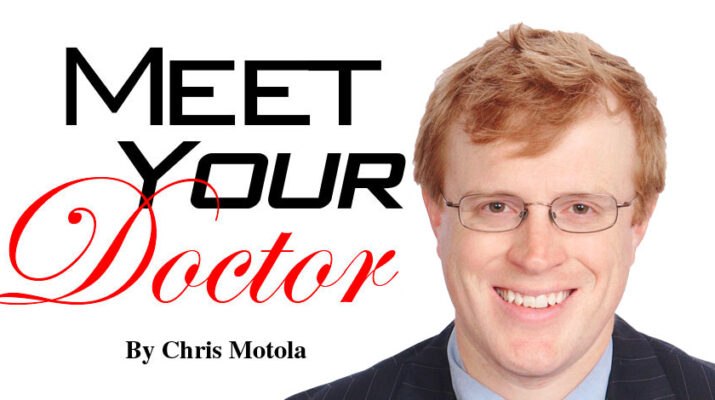New Thompson Hospital doctor enjoys his role as “community surgeon.” He discusses career and talks about why he thrives in a smaller hospital setting
By Chris Motola

Q: What falls under the auspices of general surgery?
A: I’m sort of a straight-forward bread-and-butter general surgeon — breast cancer, benign breast disease, colon cancer, colonoscopies, gall bladders, hernias of all sorts, as well as some emergency issues. That’s sort of the bulk of what I do. I’m trying to be a community surgeon in a broad-based practice. I try to take care of a lot of the simple to moderate complexity stuff so that people don’t have to go up to Rochester.
Q: What are the advantages of having these procedures done in a smaller hospital like Thompson?
A: I think for a lot of the low to moderate complexity procedures, a community-based hospital like Thompson is a really nice place to go. I think it’s totally reasonable to take those kinds of surgery here. Overall, I think people like to stay in the community and not have to worry about driving an hour and a half for a procedure they can get done close to home. It makes it easier for their family to see them if they have to stay for a day or two.
Q: We just got a pretty big regional snowstorm. I imagine that compounds the transportation issues around this time of year.
A: I can tell you an anecdote. We had a nice young man, he’s 16 with a significant intellectual disability from south of here who stayed local because the next alternative was up in Rochester. He had to stay in the hospital for a little while, so it cut the commute for his family to see him from two hours down to 20 minutes. It’s been great for his family’s morale, who are, in turn, able to support him better without having to do that commute.
Q: COVID-19 has had an impact on what surgeries could be performed for a lot of hospitals. What kind of impact has that had on you?
A: We’re fortunate enough to not have had such a high demand that we haven’t been able to handle — but it’s been close. It’s definitely been a challenge with a lot of moving pieces. But I think we’ve done well as an institution to make sure we still can take care of people.
Q: You’re relatively new to Thompson Hospital. What brought you here?
A: I’ve been here since September. It looked like an interesting practice, it’s the right size for what I’m trying to do, which is true general surgery. It’s a smaller, community-based hospital. I, myself, tend to thrive more in situations where I can form personal relationships with other patients and providers. We can get to know each other and work together better. I like it like that.
Q: Have you worked in large hospitals?
A: Just for training. Certainly in medical school, and some of my training, it was a bit bigger and the collegiality wasn’t the same. I think it’s good for patients if there’s collegiality between physicians, because it means we aren’t going to hesitate to pick up the phone and get advice from a colleague about a challenging case. I think that consistent interaction helps with that and it’s one of the upsides to working at a smaller community hospital.
Q: You mentioned “true” general surgery. How would you distinguish that?
A: In a bigger facility, general surgeons often just do acute care, inpatient stuff. At smaller hospitals, the general surgeons are doing a little bit of everything.
Q: How much time do you generally get to interact with patients?
A: Anytime I see a new patient, it’s usually a 20-minute interaction, 30 to 45 minutes for breast cancer because there tends to be more questions. That’s not something you couldn’t always get away with at a bigger facility. We have more time to take care of people.
Q: Is technology enabling general surgeons to do more, or is it pushing them to specialize more than they have in the past?
A: It depends. In a place like this, it’s allowing us to do a lot more. We’re using the daVinci robot here. Right now I’m focusing on using it for hernia repairs. Once I get more comfortable with that, I can branch out. The selling points are it’s less painful. Some people think it’s a better repair. I think it’s a little faster once you get good at it. It allows us to do more surgeries in a less invasive fashion.
Q: Do general surgeons tend to get “broader” or “deeper” as their careers progress?
A: It depends. As they go forward, they typically become deeper. I think the thing about being on call is that you have to take care of a lot of different things that come through here, whether it’s a tissue infection or gall bladders. I’m focused on hernias and breast disease that can be managed here.
Lifelines
Name: Andrew Powers, M.D.
Position: General surgeon at F.F. Thompson Hospital
Hometown: South New Berlin, New York
Education: Bachelor’s degree, Ithaca College, Ithaca; Doctor of Medicine degree from Stony Brook University School of Medicine, Stony Brook; residency in general surgery, Mary Imogene Bassett Medical Center, Cooperstown
Affiliations: F.F. Thompson Hospital; St. James Hospital
Work Experience: Advanced Surgical Services, F.F. Thompson Hospital, Canandaigua (September 2020-present); University of Rochester Medical Center, Rochester, (September 2020-present)
Specialization: Laparoscopic gallbladder, stomach, bowel, colon surgery; breast surgery for cancer and benign diseases; hernia repair; advanced abdominal wall reconstruction; colonoscopy and upper endoscopy; skin cancer and lesions – including melanoma, basal cell and squamous cell; temporal artery biopsy; port placement; wound care, abscess, soft tissue foreign body; and hemorrhoid and fissure treatment
Certification: Board-eligible in general surgery
Hobbies: Music and gardening

